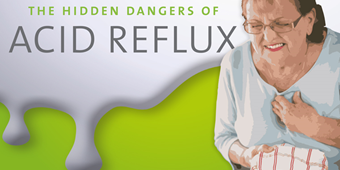Your Body May Be Signaling Crohn’s Disease

Find Your Perfect Match
Answer a few questions and we'll provide you with a list of primary care providers that best fit your needs.
Your digestive system is a complicated maze of twists and turns that for most of us, performs its tasks painlessly and efficiently. For about 500,000 Americans, however, inflammation develops within some portion of the digestive tract, resulting in Crohn’s disease.
Crohn’s disease is one of the most common of a group of diseases known as inflammatory bowel disease (IBD). Its symptoms can resemble ulcerative colitis, an IBD caused by inflammation of the rectum or large intestine. With Crohn’s disease, however, the body’s immune system can attack any part of the digestive tract, and the inflammation extends deeper into the intestinal wall. Most often, Crohn’s affects the small and large intestines.
The disease is typically diagnosed between the ages of 15 and 35, and its exact cause is unknown. Crohn’s is considered a chronic condition with no cure. However, treatment can reduce symptoms and help control flare-ups, or times of active disease.
Treatment often includes a combination of medication therapy, lifestyle management and for some patients, surgery.
Be on Alert for These Crohn’s Disease Symptoms
Your body is good at communicating digestion problems, including a wide range of disorders and diseases that are easy to confuse. Irritable bowel syndrome (IBS), for example, is a common digestive disorder, but it’s not as serious as Crohn’s disease. Its symptoms typically include crampy abdominal pain, diarrhea and/or constipation, bloating, gas and mucus in the stool. It’s not accompanied by fever or bleeding, as is often the case with Crohn’s disease.
Know the difference in symptoms to avoid dismissing your discomfort as IBS and delaying treatment.
Symptoms of Crohn’s disease include:
- Belly pain and cramping (often in the lower right area)
- Rectal bleeding
- A cut or tear in the anus (anal fissure)
- Urgent need to move bowels or sensation of incomplete evacuation
- Constipation
- High fever and chills
- Loss of appetite; possible weight loss
- Bloody or persistent diarrhea
- Nausea or vomiting
- Joint pain
- Skin rashes and ulceration
- Eye inflammation
How is Crohn’s Disease Diagnosed?
Your health care provider will review your symptoms and medical history and conduct a physical exam. She also may perform blood tests, a stool culture (to check for bacteria in your digestive tract) and advanced diagnostic testing.
These tests may include X-rays, CT scans, MRI and tests that offer views inside your digestive tract, from your mouth to your anus.
If there’s a history of Crohn’s disease in your immediate family, you may be at higher risk for developing the disease and benefit from a risk assessment.
What’s the Treatment for Crohn’s Disease?

While there is no cure for Crohn's disease, treatment can ease symptoms during flare-ups and help keep the disease in remission. Treatment often includes a combination of medication therapy, lifestyle management and for some patients, surgery.
Medications: Medicines range from those that help control your body’s immune system to corticosteroids for reducing inflammation.
Diet, nutrition, stress and lifestyle modifications can all lead to improved quality of life in patients with Crohn’s disease. Certain foods can worsen symptoms. These foods vary from person to person. But high-fiber foods (such as fresh vegetables) and high-fat foods (such as dairy products and red meat) cause symptoms in many people.
Smoking should be stopped by all who have Crohn’s or are at increased risk of developing Crohn’s, since smoking is associated with more severe forms of the disease.
Surgery may help control Crohn's, but it is not a cure. Your doctor can provide surgical options based on your treatment history and response.
Don’t let Crohn’s disease control you. Take action and try these tips as a complement to your physician’s care and treatment:
- Keep a food diary to identify foods that cause you problems
- Eat more small meals instead of three big meals, especially when you won’t have easy access to bathrooms
- If you’ve had a recent flare-up, eat foods that you know will limit your symptoms
- Know where to find clean bathrooms
- Exercise daily
- Take a stress reduction class
- Find a support group
- Develop a longstanding relationship with a gastroenterologist
Find Your Perfect Match
Answer a few questions and we'll provide you with a list of primary care providers that best fit your needs.
Source: American College of Gastroenterology; Crohn’s and Colitis Foundation




